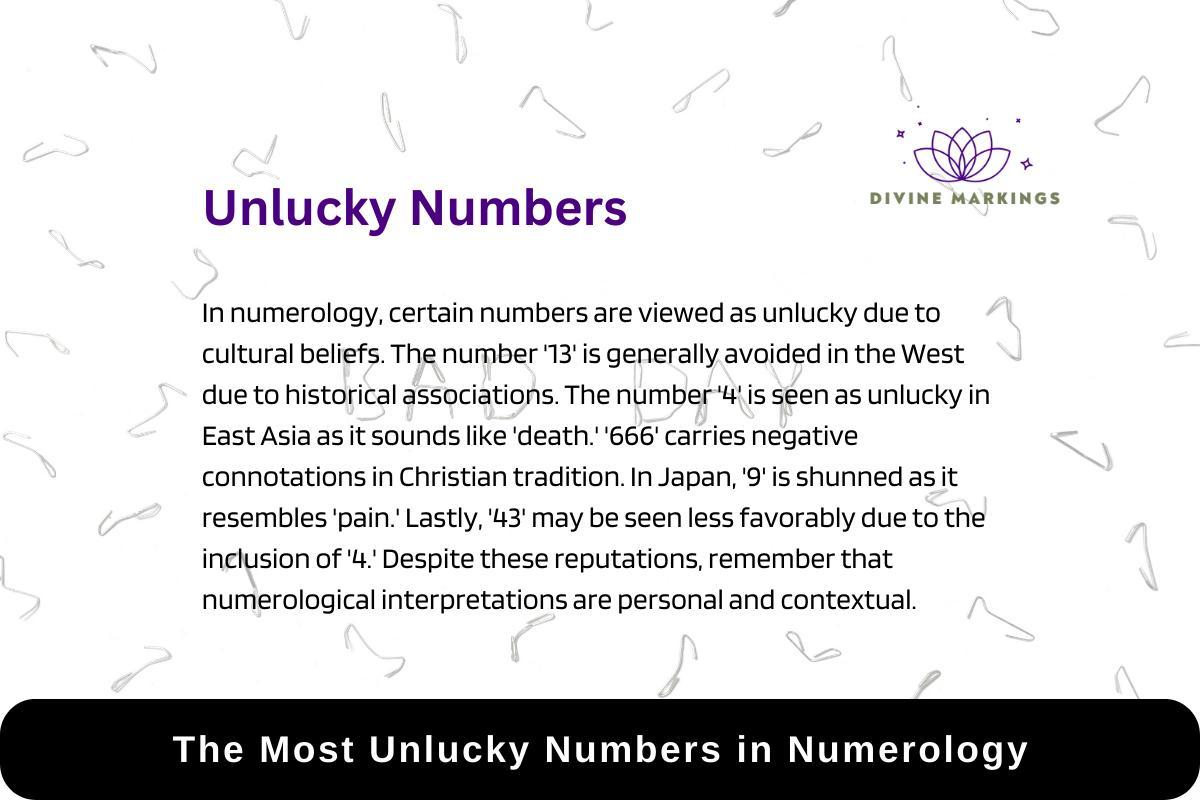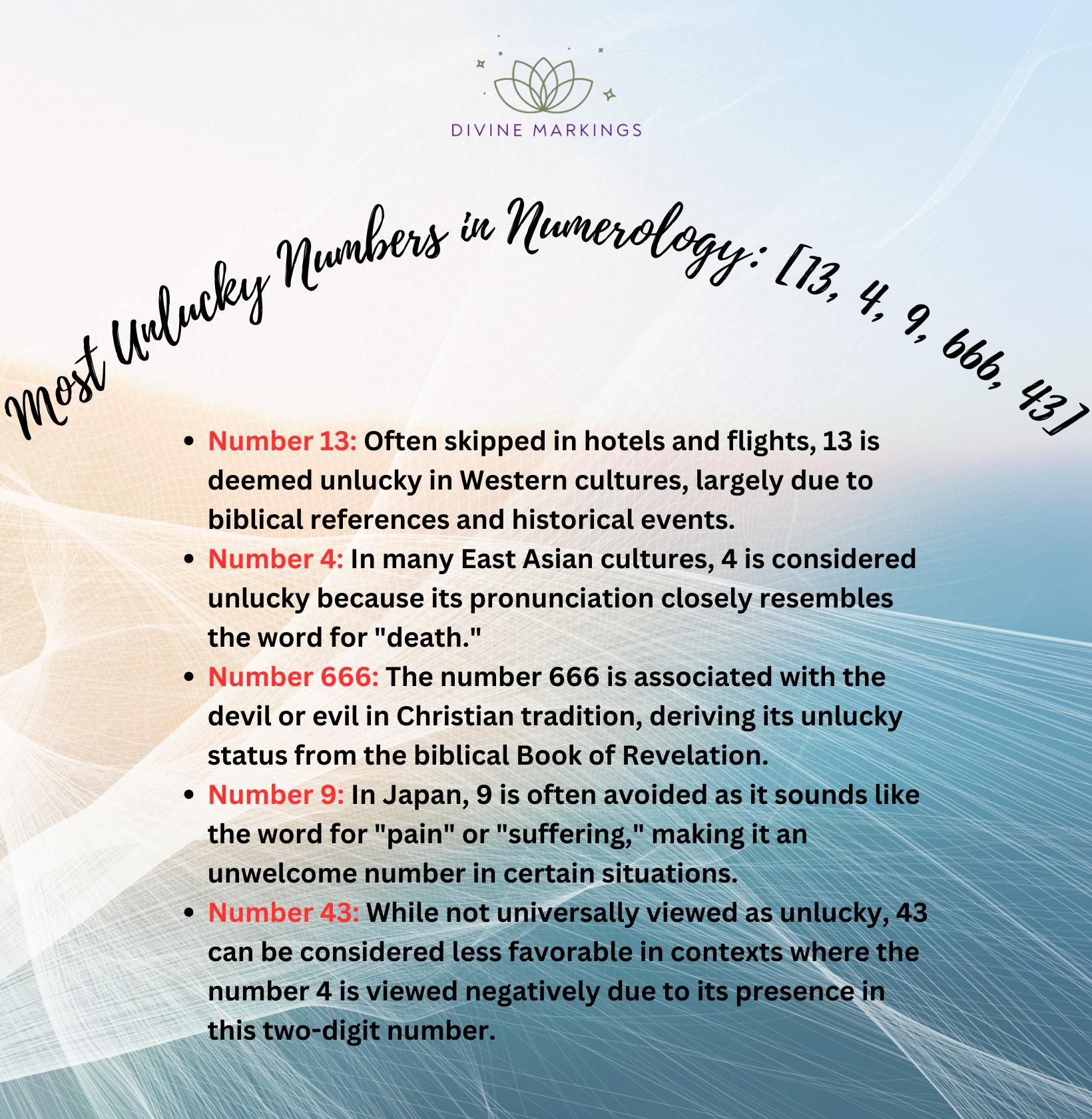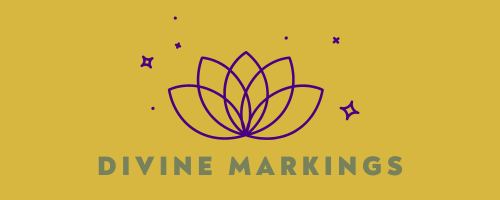Numerology, a centuries-old study that connects the mystical significance to numbers, is a multidimensional field. As far back as Pythagoras, the ancient Greek mathematician who proposed the theorem that bears his name, numbers have held a profound fascination for human beings. However, over time, certain numbers have acquired reputations for being unlucky. This perception is usually rooted in cultural, historical, and symbolic associations that have been passed down through generations.
In the context of unlucky numbers, they often have deep-seated roots in cultural superstitions and traditional beliefs. For instance, in many Western cultures, the number ’13’ is seen as unlucky, and in many East Asian cultures, the number ‘4’ holds similar status due to its phonetic similarity to the word ‘death.’ The objective evidence for these numbers being genuinely ‘unlucky’ is negligible, yet their influence persists in various facets of life, from building floors to airplane seats.
This article embarks on an exploration of these so-called unlucky numbers. It examines the historical and cultural origins of some of the most infamous ones, the psychological impact they can have, and the ways in which society has adapted to this fear. Finally, it looks at the controversies and critiques surrounding these beliefs. Through this journey, you’ll gain a deeper understanding of numerology, society, and perhaps even yourself. So, prepare to view the numbers in your life through a brand new lens!
the Concept of Unlucky Numbers in Numerology
It’s a curious thing, really, how a simple number can bring about cold sweats or make you change your plans. But that’s the essence of unlucky numbers in Numerology – they’re a little bit like that one cousin who always seems to bring trouble along with them.
First things first, what even is an unlucky number? Picture this: numbers are like actors, and depending on the stage – or numerological system – they’re on, they might be cast as the hero, the sidekick, or yes, the villain. In simpler terms, an unlucky number is a digit that, due to various cultural, historical, or numerological contexts, has been associated with misfortune or negativity.

It’s fascinating how much weight we humans can attach to symbols, isn’t it? Way back when, in the ancient civilizations of Greece, China, and India, numbers were seen not just as mathematical concepts, but as spiritual and symbolic entities. Number 13, for instance, had a bad rap in Western culture because of its association with the Last Supper, where 13 individuals were present, one of whom betrayed Jesus Christ.
And it’s not all ancient history. The fear of certain numbers, known as numerophobia, affects people even today, causing stress, anxiety, or even changes in behavior. Like avoiding the 13th floor? Well, you’re not alone! A whopping 80% of high-rise buildings in the U.S. don’t have a 13th floor, due to this superstition!
Unlucky Numbers in Various Numerological Systems
If you thought numbers were universal, think again. A lucky number in one corner of the globe can be a harbinger of doom in another.
Unlucky Numbers in Pythagorean Numerology
Remember Pythagoras? That old Greek philosopher with the theorem? Yep, he had some ideas about unlucky numbers too. In Pythagorean Numerology, numbers are associated with specific vibrational frequencies or energies. Number 9, for instance, was considered a little tricky, as it always comes back to itself when multiplied (9 x 2 = 18, 1+8 = 9).
Unlucky Numbers in Chinese Numerology
In Chinese Numerology, the focus is more on how a number sounds when spoken. The number 4, pronounced ‘si,’ sounds very much like their word for death – a chilling coincidence, don’t you think? No wonder many East Asian countries go to great lengths to avoid this number.
Unlucky Numbers in Indian Numerology
Meanwhile, over in the Indian subcontinent, the number 8 gets the stink-eye. In Indian Numerology, 8 is associated with Saturn, a planet seen as a bringer of hardships and struggles.
Comparing Unlucky Numbers Across Systems
So, as we’ve seen, unlucky numbers are quite the world travelers. They vary wildly from one system to the other, highlighting the rich tapestry of beliefs, cultures, and traditions that our globe has nurtured over the centuries.
Detailed Analysis of The Most Unlucky Numbers
Now that we’ve dipped our toes in the pool of unlucky numbers, let’s dive deeper into the specifics of some of the more notorious ones.

The Curious Case of Number 13
Oh, number 13, the infamous “unlucky” number that makes even the bravest amongst us a little jittery. It’s been the subject of horror movies, novels, and countless urban legends. But why is it considered unlucky? As mentioned before, part of it comes from Christian traditions, associating it with betrayal and the onset of tragic events. Moreover, it also stands out because it follows 12, a number considered “complete” (think 12 months, 12 zodiac signs, 12 Apostles, etc.), and therefore, 13 is seen as an anomaly.
Number 4: The Deathly Digits
If you’re in East Asia, number 4 is as unlucky as they come. Buildings often skip the fourth floor, and people avoid phone numbers or license plates with the number 4. The association with death is so strong, it can sometimes feel like you’re trapped in a permanent Halloween movie!
Number 666: Number of The Beast
666, the “number of the beast” from the Book of Revelation in the Bible, is another number that’s been forever branded as unlucky. So potent is its association with the devil, that people even fear to write it or say it out loud, treating it like the numeric equivalent of Voldemort – the number that must not be named.
Number 9 and Its Controversial Reputation
Over in Japan, number 9 gets the cold shoulder because it’s pronounced “ku,” which is similar to the word for suffering. Although not all sectors of Japanese society hold this belief, the impact is still noticeable in daily life, with some hospitals skipping Room 9, for instance.
Number 43
In general numerology, the number 43 is not traditionally considered an unlucky number. However, like all numbers, its interpretation can vary based on the specific numerological system or cultural context.
In Pythagorean Numerology, which assigns meanings to numbers based on their vibrational energies, the number 43 (which reduces to 7 by adding 4+3) is often associated with introspection, spirituality, and deep thinking. These can be positive traits, but can also lead to feelings of isolation or confusion if not well balanced, potentially leading some to view it as less favorable.
That being said, it’s important to remember that numerology is highly personal and contextual. The “luck” or “unluck” of a number can depend heavily on its context within an individual’s numerological chart and life circumstances. The number 43 appearing in one person’s chart might carry different implications than in someone else’s.
Lastly, cultural beliefs can also influence how a number is perceived. For example, in certain East Asian cultures, the number 4 is considered unlucky because it sounds like the word for “death” when pronounced. Therefore, in such a context, 43 might be viewed less favorably due to the presence of 4.
The Influence of Unlucky Numbers on Personal Numerology
Just like you wouldn’t want to be stuck with a flat tire on a road trip, you’d probably prefer to avoid unlucky numbers in your personal numerology. But how do they affect your journey?
Unlucky Numbers in a Person’s Life Path
In numerology, your Life Path number, calculated from your birthdate, is a bit like your personal GPS. It shows your life’s purpose, challenges, and opportunities. An unlucky number in your Life Path can feel like hitting every red light on the way to your destination. But don’t panic just yet. Remember, it’s not about the hand you’re dealt, but how you play your cards.
The Role of Unlucky Numbers in Destiny Numbers
Your Destiny Number, derived from your full name, can highlight your potential, skills, and talents. If an unlucky number pops up here, it might seem like a shadow lurking in your sunlit garden of abilities. But fret not – every cloud has a silver lining, and each number has both positive and negative aspects.
Implications of Unlucky Numbers in Soul Urge Numbers
Your Soul Urge Number, calculated from the vowels in your name, reflects your heart’s deepest desires and motivations. An unlucky number here might seem like a thorn in your side. But here’s a secret – sometimes, it’s the challenges that fuel our greatest growth.
Unlucky Numbers and Expression Numbers
Your Expression Number, determined by the sum of all the letters in your name, is a measure of your potential and the way you express it to the world. An unlucky number here could be akin to singing a high note and having your voice crack. But don’t worry – every performance is a chance to learn and improve.
Read Also: What Are Angel Numbers?
Unlucky Numbers in Daily Life
We’ve already touched on a few instances of how unlucky numbers seep into our daily lives. Let’s delve a little deeper, shall we?
Unlucky Numbers and Architecture
Ever ridden an elevator and wondered why there’s no button for the 13th or 4th floor? Or visited a hotel with no room 666? That’s numerology in action, folks! Architects and designers often skip unlucky numbers to cater to public superstition.
Unlucky Numbers in Business and Finance
In the world of business and finance, numbers can be a make or break. Chinese businesses, for example, pay hefty amounts for phone numbers or addresses without the number 4. Talk about taking “money is no object” to the next level!
Unlucky Numbers in Sports and Gaming
In sports and gaming, players often avoid unlucky numbers on jerseys, betting, and even game strategies. Remember the saying, “leave nothing to chance”? In these high-stakes fields, every little advantage or disadvantage counts.
Unlucky Numbers in Date and Time Selection
Certain cultures, especially those with strong numerological traditions, even factor unlucky numbers into their calendar. In Japan, for instance, people avoid holding ceremonies on the 9th of the month, while in Western cultures, Friday the 13th is often viewed as a day of bad luck.
Overcoming the Fear of Unlucky Numbers
Facing our fears can be as daunting as climbing a mountain, but it’s the only way to reach the summit. If you’re spooked by unlucky numbers, here are a few strategies to regain your footing.
Psychological Techniques
One man’s meat is another man’s poison, and one person’s unlucky number can be another’s favorite. If your fear of unlucky numbers is causing distress, psychological techniques like cognitive-behavioral therapy can help you unpack your fears and build healthier thought patterns.
Numerological Neutralization
In Numerology, no number is entirely bad or good. So, if you’re dealing with an unlucky number in your chart, consider it an opportunity to focus on its positive aspects or balance it with more favorable numbers.
Cultural Adaptations
Culture, like a river, is always flowing and changing. Modern interpretations of unlucky numbers often focus on their positive aspects. For instance, in Western culture, some people embrace Friday the 13th as a day of rebellion or uniqueness.
Critiques and Controversies Surrounding Unlucky Numbers
With any belief system comes debate, and numerology is no exception. The concept of unlucky numbers has seen its fair share of critiques and controversies.
Scientific Perspectives
From a scientific perspective, the notion of unlucky numbers can seem a tad… well, unlucky. After all, numbers are just numbers, and any attributed luck or unluckiness is purely a human invention.
Cultural Critiques
Some cultural critiques point out that the fear of unlucky numbers can lead to irrational behavior or even discrimination. For example, the widespread avoidance of number 4 in East Asia can sometimes border on obsession.
Controversial Use in Media and Popular Culture
The media and pop culture often use unlucky numbers to sensationalize content, sometimes reinforcing fears and superstitions. The number 666, for instance, is frequently exploited in horror movies and novels, often contributing to its “evil” reputation.
Conclusion
As we come to the end of our numerological journey, it’s clear that unlucky numbers are more than just digits on a page. They’re a mirror of our hopes, fears, cultures, and histories. Remember, though, that numbers don’t make our fate – we do. So, whether you encounter a 13, a 4, or a 666, know that it’s just a number. As for us, we’re looking forward to exploring more mystical numerical landscapes with you.
Remember, keep counting, but don’t let the numbers count you. See you next time!
